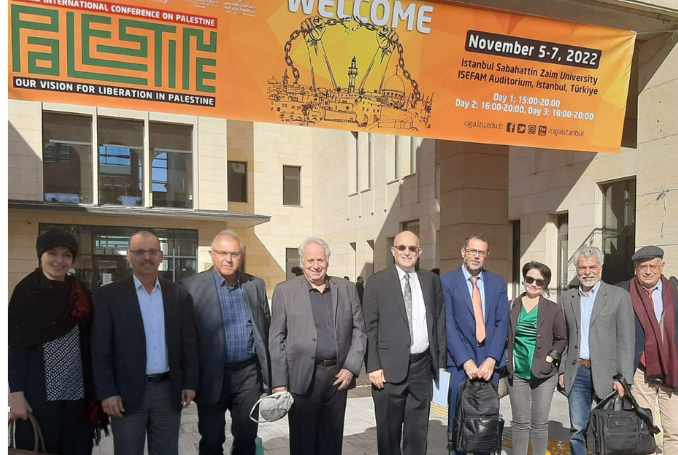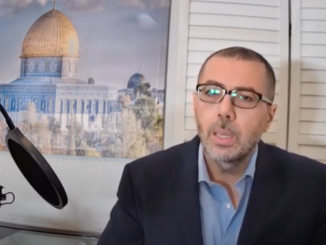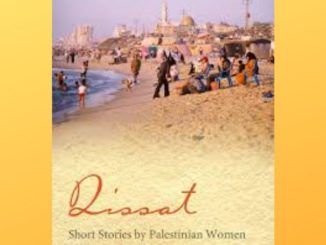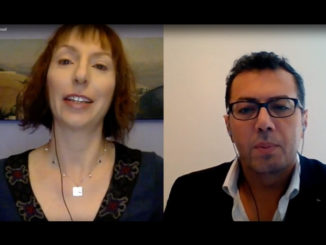
The Third Conference on Palestine began on Saturday in the Turkish city of Istanbul, under the title “Our Vision for Liberation in Palestine”.
The three-day conference is entirely focused on the recently released book Our Vision for Liberation: Engaged Palestinian Leaders and Intellectuals Speak Out, co-edited by Ramzy Baroud and Ilan Pappe.
Organized by the Center for Islam and Global Affairs (CIGA), at Istanbul Sabahattin Zaim University, the first day of the conference saw the participation of many contributors to the book, either in person or virtually, as well as other prominent intellectuals and Turkish and Arab lawmakers and scholars.
Though recently released, Our Vision for Liberation, co-edited by Ramzy Baroud and Ilan Pappe, has proven to be a great success in its English and Arabic editions. We urge you to obtain a copy of this book and join the critical discussion. https://t.co/F5Np0bHnYR via @amazon
— The Palestine Chronicle (@PalestineChron) November 6, 2022
The conference started with an introduction by Professor Sami al-Arian, Director of the CIGA Center and contributor to the book.
Hasan Turan, a lawmaker and chairman of the Palestine Committee at the Turkish Parliament, said that Palestine is a “fundamental issue” and a “litmus test for the whole of humanity.”
IZU rector, professor Ahmet Cevat Acar, called for “efforts and discussions” for “viable solutions,” noting how “this is a problem created by Zionists which is a question for all humanity.”
Professor Richard Falk, former United Nations Special Rapporteur on the Situation of Human Rights in Palestine and Professor Emeritus at Princeton University, noted in his keynote speech how “Culture is an important instrument of liberation” and how “this book is perhaps the most powerful testimonial of this cultural awareness for a politics of liberation”.
Professor Ilan Pappé talked about the message of unity that transpired throughout the whole process of the book. He highlighted the valuable “human capital” that emerges from this volume and how “Palestinians, although subjected to a trauma, did not allow the trauma to define them”.
+++ LIVE COVERAGE FROM THE THIRD INTERNATIONAL CONFERENCE ON PALESTINE: OUR VISION FOR LIBERATION
Prof Richard Falk: "Culture is an important instrument of Liberation and this book is perhaps the most powerful testimonial of this cultural awareness for a politics of liberation" pic.twitter.com/G6wl2MtJt6— The Palestine Chronicle (@PalestineChron) November 5, 2022
For his part, Dr. Ramzy Baroud illustrated the book project in its entirety, saying: “Liberation is a complex and multi-faceted concept that cannot be reduced to cliches and ready-to-serve recipes of quick ‘solutions’.” “The struggle for Liberation is taking place in Palestine on a daily basis and manifests itself in every aspect of Palestinian life,” Baroud added.
Mr. Hasan Abu Nimah, a former diplomat, recalled how Israel never truly wanted to negotiate throughout the various stages of the so-called peace process. However, he said, “Palestinians simply refuse to surrender,” adding that “Every time Israel seems to have crushed Palestinian Resistance, a new generation arises.”
Palestinian archeologist Hamdan Taha spoke about the importance of archeological studies, stressing how “The battle of archeology in Palestine is between the indigenous Palestinian narrative and the Israeli colonial narrative”.
Christian leader Father Manuel Musallam offered a direct testimony of what the Palestinian people had to go through following the Nakba and the creation of the state of Israel on the ruins of historic Palestine in 1948. “All Arabs should understand that we Palestinians want our freedom and our rights,” he said, adding: “This is why we resist. We have no one but God and a rifle”.
+++ LIVE COVERAGE FROM THE THIRD INTERNATIONAL CONFERENCE ON PALESTINE: OUR VISION FOR LIBERATION +++
Father Manuel Musallam: "All Arabs should understand that we Palestinians want our freedom and our rights. This is why we resist. We have no one but God and a rifle". pic.twitter.com/Rq9YBkCiY0
— The Palestine Chronicle (@PalestineChron) November 5, 2022
Dr. Ghada Karmi, who contributed with a chapter on her vision of a One Democratic State in Palestine, stated that “Between the Jordan River and the Mediterranean Sea, there is already one state. Unfortunately, it is an apartheid state.”
From Hawaii, Professor Ibrahim Aoudé introduced his chapter about the connection between language and liberation, stating that “You cannot divorce Zionism from colonialism and global capitalism.”
Professor Ghada Ageel offered a personal account of how her grandmother and the women in the Gaza refugee camp she grew up in forged her whole vision about Palestine, history and anti-colonialism. “For me, my grandmother was the historian, the resistant,” she said, adding, “Through her narrative, she communicated the personal and the collective, anti-colonial history. History legitimizes us.”
Dr. Samah Sabawi talked about the deep connections among indigenous struggle throughout the world and the absence of the Nakba from Western academia: “The Palestinian experience of the Nakba is completely absent from the studies within the trauma genre. This is why,” she said, “I had to write in a blank space,” referring to the title of her chapter in the book.
(The Palestine Chronicle)








